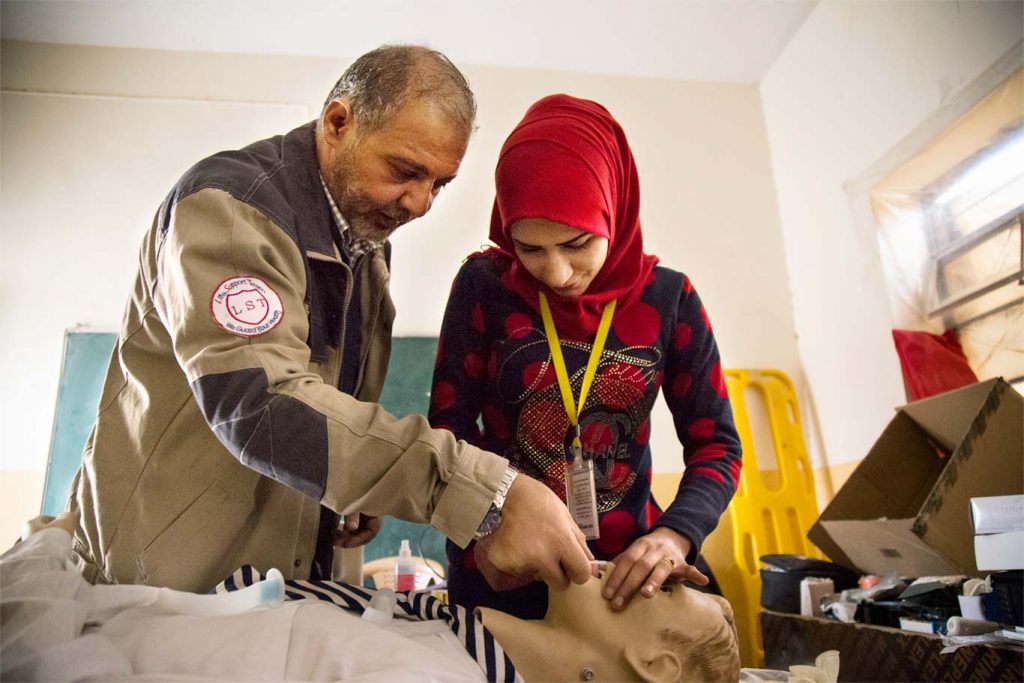
Health Systems
Health Services Support
A strong health system delivers quality services when and where they are needed. Though the exact structure and function of health systems vary from country to country, quality healthcare systems require well-maintained facilities, adequate medical supplies and efficient logistics. Such systems also need a well-trained and adequately compensated workforce, reliable health information on which to base decisions and policies, and a robust financing mechanism.
Our goals at International Medical Corps include:
- Improving the overall quality of healthcare services delivered throughout the continuum of care—from the community to district hospital- and tertiary-level facilities—by training and building the capacity of healthcare workers, providing essential supplies and equipment, and utilising quality assurance tools to meet minimum standards for patient care;
- Promoting accountability for healthcare delivery at the consumer and provider levels—which requires support for community, district and national health committees through capacity-building initiatives, transparent reporting systems and community engagement strategies to foster trust and ensure equitable access;
- Strengthening district-level health service management, including planning, monitoring, technical and logistics support for supervision, as well as health information management and pharmaceutical supply-chain support;
- Supporting ministries of health as they make the transition from emergency to development, including developing strategies, health protocols and guidelines, and conducting gap analysis; and
Constructing facilities and providing equipment.
Our Response
Our response to building a strong health system is anchored in our commitment to strengthening the skills and knowledge of those at every level who staff the system. We do this by drawing on our extensive experience in training. We partner with local community leaders to build confidence and develop solutions that best fit local conditions.
For example, in Lebanon we are strengthening the primary healthcare (PHC) system by working with the Ministry of Public Health to develop a primary-care package and protocols adapted to the Lebanese context. We train healthcare workers on the PHC package and protocols using a combination of Ministry of Health-developed training materials, classroom-based instruction, clinical simulations and case-based learning. International Medical Corps and the Ministry of Health jointly strengthen referral pathways between PHC centres and both public and private hospitals. We procure and distribute lifesaving medical supplies and equipment to PHCs and support them with electronic health records to streamline patient care and improve health-data quality.
In Somalia, we are improving health system resilience to extreme heat and non-communicable diseases across the practice-and-policy continuum, working with local authorities to conduct vulnerability and capacity assessments, provide public health information to community members, creating health-response plans for heatwaves, training doctors on the diagnosis and management of heat-related illness, and adapting national policies and clinical protocols to account for the impact of heatwaves.
Our integrated strategy also draws on the expertise we have in our technical specialities, including water, sanitation and hygiene; nutrition; reproductive, maternal and newborn health; mental health and psychosocial support; and family and community health.
In the Central African Republic, we worked with the Ministry of Health to open a training institution with a direct-entry course for midwifery assistants. The first cohort of midwifery assistants, drawn from rural communities near Bria, graduates from the two-year programme in 2026.
We responded to the COVID-19 pandemic in 30 countries. Over the course of the response, we served nearly 7 million direct beneficiaries, supported approximately 1,200 health facilities, trained more than 23,000 healthcare workers on infection prevention and control measures, reached more than 4.6 million people with COVID-19 awareness activities, screened more than 4 million people for COVID-19 and treated more than 50,000 suspected cases.
We support global polio eradication efforts in several countries, including Cameroon, the Democratic Republic of the Congo, Ethiopia, Mali, Yemen and, most notably, in northern Nigeria—one of only three countries in the world where vaccine-derived poliovirus (VDPV) continues to be a public health threat. Because VDPV (a marker of low immunisation coverage) continues to be a concern, our extensive network of community volunteers helps with community sensitisation, community surveillance and tracing.